2023 QPP Requirements
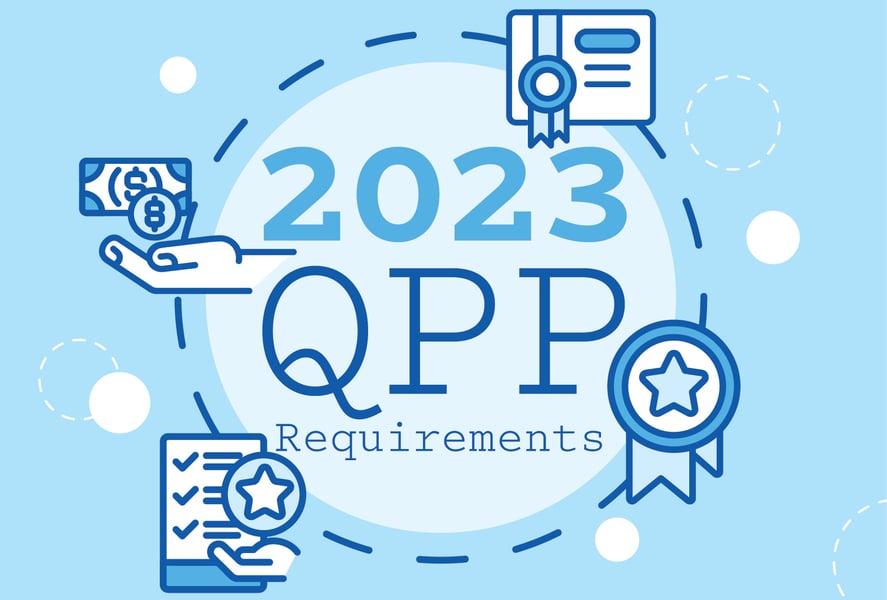
The Quality Payment Program has undergone some major changes over the last several years and CMS has signaled that they intend to further modify the program in the years to come. It's hard to keep all the requirements straight. In this article we will cover the major themes that came out of the recent final ruling, review the base requirements for all participants and then review the individual requirements according to a clinician's participation status.
Major Theme Changes
There are three major themes to the changes CMS unfolded as a part of the 2023 PFS Proposed Rule.
Theme 1: MSSP ACOs must start reporting using eCQMs or CQMs. CMS did not extend the deadline for transitioning away from CMS Web Interface measures. That means by 2025, everyone is reporting Quality measures as either eCQMs or CQMs
Also see: eCQM vs CQM vs Web Interface: Understanding the Difference
Theme 2: Subgroup reporting by specialty type is on the horizon. CMS introduced a new reporting framework available for the first time this year called MIPS Value Pathways (MVPs). MVPs include measures that are for specific specialty groups (like rheumatologists). CMS finalized five additional MVPs so while there are 12 different MVPs a group could use to report only seven are available in 2023. Sub-group reporting is optional until 2026 when it becomes mandatory (if you choose report this framework).
Also see: [E-BOOK] MIPS MVPs: A Guide to Reporting
Theme 3: The end of Traditional MIPS is hovering like a specter above us. CMS didn't commit to it, but they continue to say they are considering retiring the Traditional MIPS reporting framework by 2027, which would mean everyone must report under the MVP reporting framework (subgroup reporting by specialty type required) or be involved with an APM Entity (such as an ACO) and report through the APM Performance Pathway (APP) framework.
Let’s dive into the details.
Understanding MIPS Participation Eligibility
We start by reviewing the types of MIPS participants to understand your options better.
CMS puts Eligible Clinicians into one or more categories.
- Not eligible
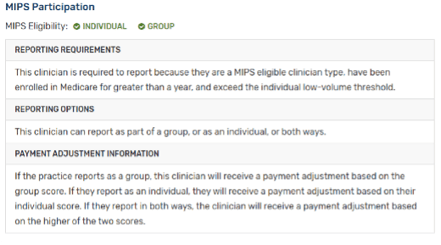
- Clear enough.
- MIPS Eligible Clinician Individual
- As an individual clinician you are required to report to MIPS.
- MIPS Eligible Clinician Group
- As an eligible clinician you are required to report to MIPS, and you are able to report as part of a group. Groups are made up of clinicians who all bill with the same Tax ID (TIN).
- MIPS Eligible Clinician Virtual Group
- As an eligible clinician you are required to report to MIPS, and you are able to report as part of a virtual group. Virtual groups must be comprised of 10 or fewer Eligible Clinicians and, as a group, exceed the low-volume threshold.
- Qualifying APM Participant (QP)
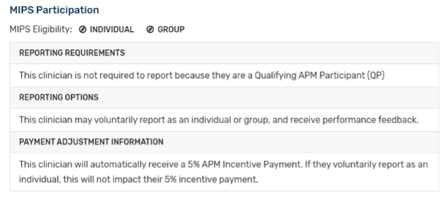
- This clinician is a part of an Advanced APM Entity and therefore does not have to report to MIPS and automatically receives a +5% payment.
- This clinician is a part of an Advanced APM Entity and therefore does not have to report to MIPS and automatically receives a +5% payment.
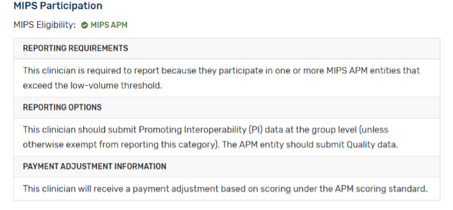 MIPS APM Participant
MIPS APM Participant
- This clinician is part of an APM Entity, but it is not an Advanced APM, therefore they still must submit data for MIPS.
- This clinician is part of an APM Entity, but it is not an Advanced APM, therefore they still must submit data for MIPS.
One more thing I’ll add here is that those participation statuses apply to the NPI associated with each provider. We will also be referencing APM Entities in the information below. An APM Entity is responsible for reporting to the MIPS program on behalf of their participants. There are Advanced APMs which take on some form of financial risk. These organizations do not have to report to MIPS. There are other APM Entities which are not designated as advanced. ACOs make up a good portion of these types of organizations.
As an individual clinician you may have relied on your ACO to report on your behalf.
To find out your participation framework you must check your eligibility on the QPP website.
|
Learn how Medisolv helps hospitals navigate QPP changes in 2024 |
Three QPP Reporting Frameworks
Once you know your participation status, you will understand which framework you can use for submission. There are three QPP frameworks in 2023, the Traditional MIPS Framework, the APM Performance Pathway (APP) Framework and the MIPS Value Pathways (MVP) Framework.
Traditional MIPS Framework
This is the usual MIPS framework made up of four categories and a composite score.
APM Performance Pathway (APP) Framework
The APP Framework is available to MIPS APM Entities and required for ACOs if they are part of MSSP.
MVP Framework
This is a new framework and is made up of five categories with measures specific to the specialty the MVP addresses. For example one MVP is called Advancing Rheumatology Patient Care. As you would expect, all measures in that MVP would be applicable to rheumatologists.
Here is a matrix of which framework you can report to, based on your status.
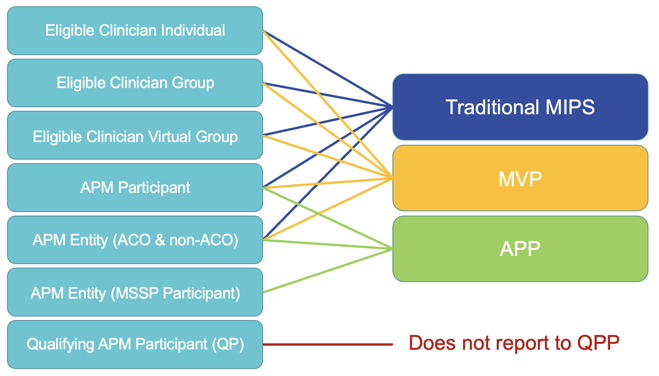
Each framework has slightly different requirements and different category weights.
MIPS Framework Category Weights
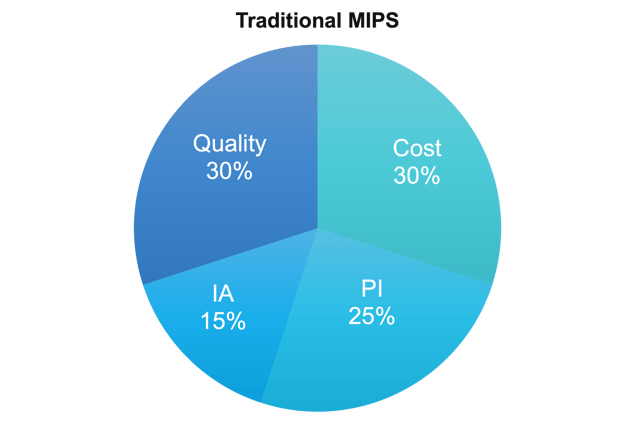
APP Framework Category Weights
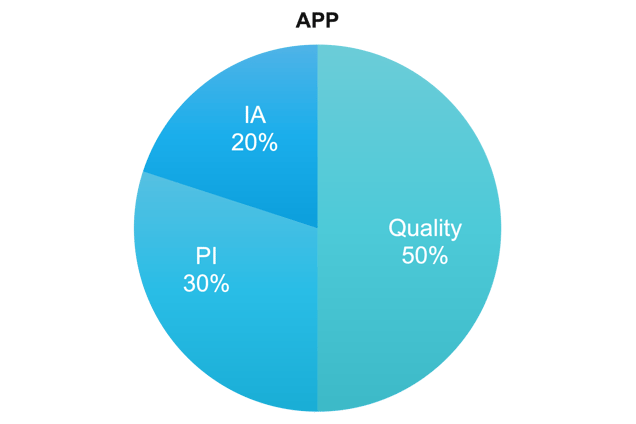
MVP Framework Category Weights
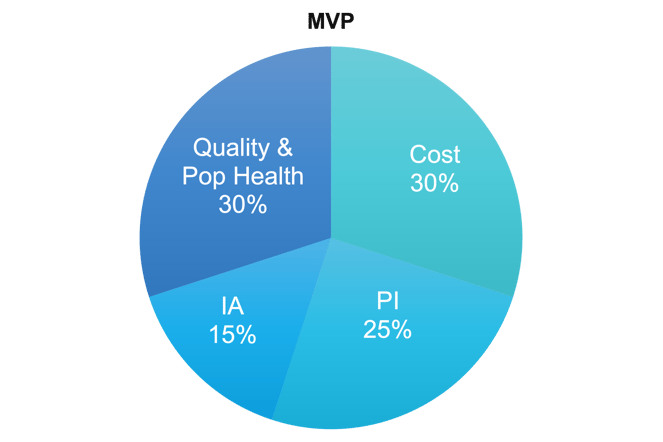
Now before we move on to the category requirements, we need to clarify one more definition, collection types.
Defining MIPS Collection Types
Collection types are the way you report the data to CMS. You can think of them like measures. There are six collection types in 2023.
- eCQMs (Electronic Clinical Quality Measures)
- MIPS CQMs (previously called Registry measures)
- QCDR measures (Qualified Clinical Data Registry)
- Medicare Part B Claims measures
- CAHPS for MIPS survey
- CMS Web Interface measures (available for MSSP ACOs only)
As I mentioned before, CMS Web Interface is going away in 2025 so if this is the primary way you submitted your MIPS measures before, you need to figure out a new collection type soon.
Which collection type you can submit depends upon your participation status. For instance, CMS Web Interface measures can only be submitted by MSSP ACO groups in 2023.
Now we are ready to review the requirements for each framework.
2023 Quality Requirements
Traditional MIPS Framework
Traditional MIPS Framework: Quality Category
Category weight: 30% of total MIPS score
Performance Period: 365 days
Requirements
- Submit 6 measures one of which is an outcome measure or high priority measure
- Report data for at least 70% of patients who qualify for a measure
- You may use a combo of collection types (listed below)
- Three administrative quality claims measures are calculated automatically
Measure list
- Quality Measures
- The 2023 measure list isn't out yet but will be found here.
- Claims Measures
- Hospital-Wide, 30-Day, All-Cause Unplanned Readmission (HWR) Rate for MIPS Eligible Groups.
- Risk-standardized Complication Rate (RSCR) following Elective Primary Total Hip Arthroplasty (THA) and/or Total Knee Arthroplasty (TKA) for MIPS
- Clinician and Clinician Group Risk-standardized Hospital Admission Rates for Patients with Multiple Chronic Conditions
- CAHPS for MIPS Survey measure
Available Collection Types
- eCQMs
- MIPS CQMs
- QCDR measures
- Administrative claims quality measures*
- CAHPS for MIPS survey measures
*Only small practices may submit quality measures using claims
Other Considerations
Submitting the CAHPS for MIPS Survey will count as reporting one high priority measure. Select five other Quality measures to report, including an outcome measure if available.
There are no bonus points awarded for reporting additional outcome and high priority measures beyond the required one.
If you submit a new quality measure, there is 7-point minimum score awarded for submission in the measure’s first year and a 5-point minimum score awarded in its second year.
There is no floor for any measures submitted (with a benchmark). There used to be a minimum of 3-points, but that goes away this year.
Data Completeness Requirements
If a measure does not meet the 70% data completeness threshold, the measure will earn 0 points in 2023.
Case Minimum
If a measure does not meet case minimum requirements, the measure will earn 0 points in 2023.
APP Framework
APP Framework: Quality Category
Category weight: 50% of total MIPS score
Performance Period: 365 days
Requirements
Option 1
- Submit 3 eCQMs or CQMs
- Report data for at least 70% of patients who qualify for a measure
- You may use a combo of collection types (eCQMs or CQMs)
- Two administrative quality claims measures are calculated automatically
- CAHPS for MIPS survey
Option 2
- Submit 10 CMS Web Interface Measures
- Report data for 100% of assigned Medicare beneficiaries identified by CMS (248 cases)
- Two administrative quality claims measures are calculated automatically
- CAHPS for MIPS survey
Measure list
- Quality Measures
- eCQMs/CQMs
- Quality ID: 001 Diabetes: Hemoglobin A1c (HbA1c) Poor Control
- Quality ID: 134 Preventive Care and Screening: Screening for Depression and Follow-up Plan
- Quality ID: 236 Controlling High Blood Pressure
- CMS Web Interface Measures
- Quality ID: 001 Diabetes: Hemoglobin A1c (HbA1c) Poor Control
- Quality ID: 134 Preventive Care and Screening: Screening for Depression and Follow-up Plan
- Quality ID: 236 Controlling High Blood Pressure
- Quality ID: 318 Falls: Screening for Future Fall Risk
- Quality ID: 110 Preventive Care and Screening: Influenza Immunization
- Quality ID: 226 Preventive Care and Screening: Tobacco Use: Screening and Cessation Intervention
- Quality ID: 113 Colorectal Cancer Screening
- Quality ID: 112 Breast Cancer Screening
- Quality ID: 438 Statin Therapy for the Prevention and Treatment of Cardiovascular Disease
- Quality ID: 370 Depression Remission at Twelve Months
- eCQMs/CQMs
- Claims Measures
- Hospital-Wide, 30-Day, All-Cause Unplanned Readmission (HWR) Rate for MIPS Eligible Groups.
- Clinician and Clinician Group Risk-standardized Hospital Admission Rates for Patients with Multiple Chronic Conditions
- CAHPS for MIPS Survey measure
Other Considerations
In 2023, for an MSSP ACOs to get the maximum shared savings they must achieve a quality performance score that is greater than or equal to the 30th percentile across all MIPS quality measures and meet the Shared Savings Program Quality Performance Standard. As an added incentive, any MSSP ACO that submits using Option 1 (3 eCQMs or CQMs) can get the maximum shared savings by achieving a quality score of equal to or greater than the 10th percentile on one outcome measure AND one other measure at or above the 30th percentile.
There are no bonus points awarded for reporting additional outcome and high priority measures beyond the required one.
Data Completeness Requirements
If an eCQM or CQM does not meet the 70% data completeness threshold, the measure will earn 0 points in 2023.
MVP Framework
MVP Framework: Quality Category
Category weight: 30% of total MIPS score
Performance Period: 365 days
Requirements
- Register for one or more of the seven available MVPs between April 1 - November 30, 2023
- Submit 4 quality measures within the specific MVP (for each MVP) one must be an outcome measure
- Report data for at least 70% of patients who qualify for a measure
- You may use a combo of collection types (eCQMs or CQMs)
- CAHPS for MIPS survey
MVP Options list
- Adopting Best Practices and Promoting Patient Safety within Emergency Medicine
- Advancing Care for Heart Disease
- Advancing Rheumatology Patient Care
- Coordinating Stroke Care to Promote Prevention and Cultivate Positive Outcomes
- Improving Care for Lower Extremity Joint Repair
- Optimizing Chronic Disease Management
- Patient Safety and Support of Positive Experiences with Anesthesia
Measure list
Each measure list is specific to the particular MVP. Download your specific measure lists here.
Other Considerations
Please see the "Other Considerations" section under the Traditional MIPS framework. CMS aligned all considerations with the Traditional MIPS reporting requirements
2023 Promoting Interoperability Requirements
Traditional MIPS Framework
Traditional MIPS Framework: PI Category
Category weight: 25% of total MIPS score
Performance Period: 90 days
Requirements
- Submit the required measures (measure list below)
- Attest to these two measures: Prevention of Information Blocking and ONC Direct Review
- Collect your data in EHR technology certified to the 2015 Edition or 2015 Cures Edition Update, or a combination of both
- Provide your EHR’s CMS Identification code from the Certified Health IT Product List (CHPL)
- Conduct or review a security risk analysis on your CEHRT functionality on an annual basis
- Attest to conducting an annual assessment of the Safety Assurance Factors for EHR Resilience Guides (SAFER Guides)
Measure list
- Promoting Interoperability Measures
- e-Prescribing
- New Query of Prescription Drug Monitoring Program (PDMP) measure required
- Support Electronic Referral Loops by Sending Health Information
- Support Electronic Referral Loops by Receiving and Reconciling Health Information
- Optional: Instead of measures 3 & 4 you may submit the Health Information Exchange (HIE) bi-directional exchange measure
- Optional: Instead of measures 3 & 4 you may participate in the Trusted Exchange Framework and Common Agreement (TEFCA)
- Provide Patients Electronic Access to Their Health Information
- Report the following two measures:
- Immunization Registry Reporting
- Electronic Case Reporting
- Report one of the following measures:
- Syndromic Surveillance Reporting
- Public Health Registry Reporting
- Clinical Data Registry Reporting
Other Considerations
CMS is discontinuing automatic re-weighting for the following clinician types:
- Nurse Practitioners (NPs)
- Physician Assistants (PAs)
- Certified Registered Nurse Anesthetists (CRNAs)
- Clinical Nurse Specialists (CNSs)
CMS will continue to automatically assign a weight of zero to this category for the following titles:
- Physical Therapists
- Occupational Therapists
- Qualified Speech-language Pathologists
- Qualified Audiologists
- Clinical Psychologists
- Registered Dietitians or Nutrition Professionals
- Clinical social workers
- Small practices
Other Considerations
This year your APM Entity may submit Promoting Interoperability on behalf of the individual clinicians and groups they cover.
APP Framework
APP Framework: PI Category
Category weight: 30% of total MIPS score
Performance Period: 90 days
Requirements: Please see the Traditional MIPS Framework for measure requirements.
Other Considerations
This year the APM Entity may submit Promoting Interoperability for all individual clinicians and groups they cover. The overall PI score continues to be generated from all scores of MIPS eligible clinicians reporting participating in the APM Entity.
Bonuses are aggregated at the TIN level and added to the PI APM Entity score after the calculation. The bonus score may not exceed 10 points in total.
MVP Framework
MVP Framework: PI Category
Please see the Traditional MIPS Framework for measure requirements. This will be scored at the group level not the subgroup level.
2023 Improvement Activities Requirements
Traditional MIPS Framework
Traditional MIPS Framework: IA Category
Category weight: 15% of total MIPS score
Performance Period: 90 days
Requirements
- Submit one of the following combinations of activities
- 2 high-weighted activities
- 1 high-weighted activity and 2 medium-weighted activities
- 4 medium-weighted activities
Measure list
- IA Measures
- The 2023 measure list isn't out yet but will be found here.
Other Considerations
If you’re a clinician in any APM who is participating in traditional MIPS, you’ll earn half credit (50%) automatically for the IA category.
If you are submitting as a group at least 50% of your group's clinicians must attest to completing the same improvement activity for 90 consecutive days. The activity may be completed anytime within the calendar year so long as each clinician attesting completes the activity for 90 consecutive days.
Patient-Centered Medical Homes
If you are a Patient-Centered Medical Home and more than 50% of your practices are recognized as a PCMH, you automatically receive full credit for this category.
APP Framework
APP Framework: IA Category
Category weight: 20% of total MIPS score
Requirements: All APM Entities reporting through the APP Framework will be automatically assigned a score of 100% which is applied to all Eligible Clinicians reporting through their APM Entity.
MVP Framework
MVP Framework: IA Category
Category weight: 15% of total MIPS score
Performance Period: 90 days
Requirements
- Submit one of the following combinations of activities
- 1 high-weighted activities
- 2 medium-weighted activities
Measure list:
- IA Measures
- The 2023 measure list isn't out yet but will be found here.
2023 Cost Requirements
Traditional MIPS Program
Traditional MIPS Framework: Cost Category
Category weight: 30% of total MIPS score
Performance Period: 365 days
Requirements
- CMS will evaluate your performance on 25 claims measures.
Measure list
- Cost Measures
- The 2023 measure list isn't out yet but will be found here.
Other Considerations
If you don't meet the established case minimum for any of the 25 measures to be scored, the cost performance category will receive zero weight when calculating your final score and the 30% will be distributed to another performance category (or categories).
APP Framework
Not applicable.
MVP Framework
MVP Framework: Cost Category
Category weight: 30% of total MIPS score
Performance Period: 365 days
Requirements
Please see the Traditional MIPS Framework for measure requirements. You will only be scored on the Cost measure relevant to your specific MVP.
Measure list
Each measure list is specific to the particular MVP. Download your specific measure lists here.
2023 Population Health Requirements
Traditional MIPS Framework
Not applicable.
APP Framework
Not applicable.
MVP Framework
MVP Framework: Population Health Category
Category weight: Combined with your Quality Score
Performance Period: 365 days
Requirements
-
Select 1 of the 2 population health measures available at the time of MVP registration
-
Q479: Hospital-Wide, 30-day, All-Cause Unplanned Readmission (HWR) Rate for the Merit-Based Incentive Payment System (MIPS) Groups
-
OR
-
- Q484: Clinician and Clinician Group Risk-standardized Hospital Admission Rates for Patients with Multiple Chronic Conditions
MIPS 2023 Bonus Points
There are many opportunities to get bonus points within the MIPS program.
Improvement Bonus: Up To 10 Points
Clinicians will be rewarded if they demonstrate any improvement to their 2023 Quality score over the prior year (pending there is enough data for comparison). New Clinicians will be rewarded up to 1 additional point for improvement to their Cost performance scores.
Complex Patient Bonus: 5 Points
For clinicians who work with patients that have more complex cases, CMS will award up to 5 points to account for the additional complexity of treating their patient population.
Small Practice Bonus: 6 Points
An additional 6 bonus points will be added to the numerator of the Quality category for anyone qualifying as a small practice.
MIPS 2023 Score Threshold
To avoid a -9% penalty, you must score at least 75 points.
Reimbursements
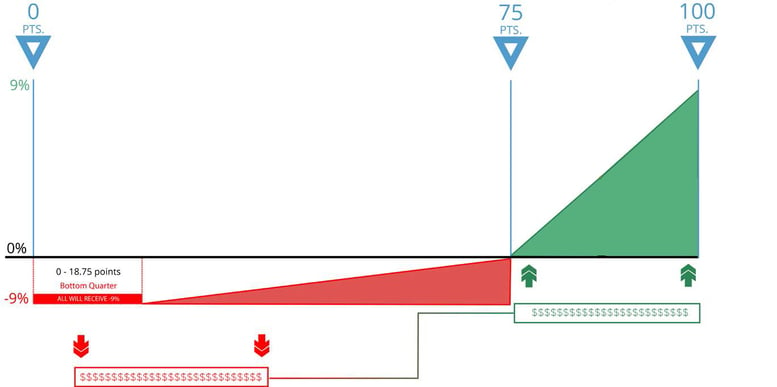
0-18.75 Points
If your score is between 0 and 18.75 points in 2021, you will lose -9% from your 2025 Medicare fee schedule (in red above).
18.76-74.99 Points
If your score is between 18.76 and 74.99 points you will receive a reduction to your 2025 Medicare fee schedule between -8.99% and 0%
75 -100 Points
75 points is the performance threshold. CMS will take the funds of those who did not meet the threshold (in red) and distribute them among those who did meet the threshold (in green). Anyone whose MIPS score is between 75 and 100 points will receive some portion of those funds – up to a 9% increase to their 2025 Medicare fee schedule.
Note: There is no longer an Exceptional Performance bonus
Important dates to remember
January 1, 2023 is the start date to track 365 days of Quality and Cost category measures. For the Promoting Interoperability category and the Improvement Activities category, you may start between January 1 and October 2, 2023 to track your measures for a minimum of 90 days.
The last day to submit all of your performance data is March 31, 2024.
|
MEDISOLV MIPS PACKAGE Medisolv Can Help
|

.png?width=352&name=2026%20Quality%20Reporting%20Deadlines%20Guide%20(1).png)



Comments